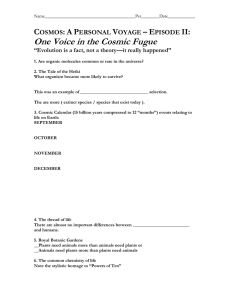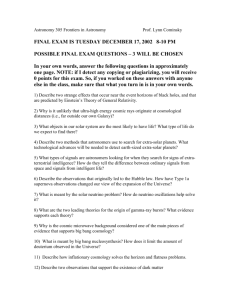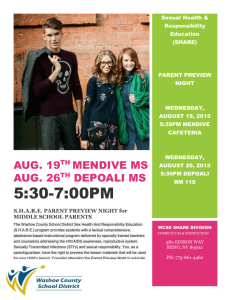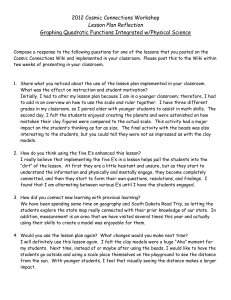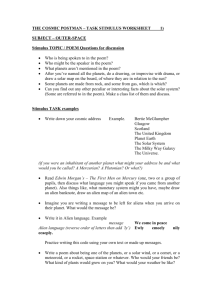Lesson 1-0 Slides The Cosmic Landscape
advertisement
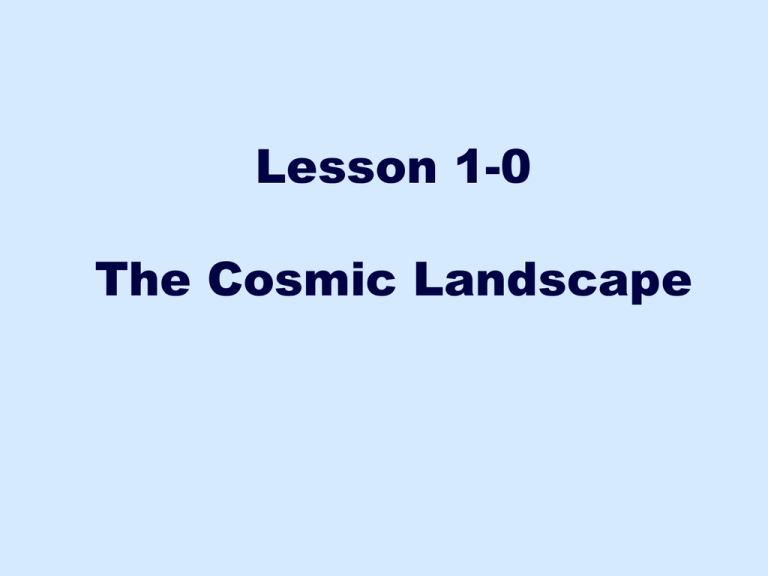
Lesson 1-0 The Cosmic Landscape Preface overview The Earth and Moon The planets The Sun Our solar system and galaxy Gravity—the universal force The Cosmic Landscape Lesson 1: No Arny assignment, Preview 2 Motivation Earth and Moon are part of a much larger system. The Cosmic Landscape Lesson 1: No Arny assignment, Preview 3 Lesson overview What other planets orbit our Sun? How big is the Sun? What makes up our solar system? How can we measure distances? What is the Milky Way? What is your universal address? What force holds our universe together? The Cosmic Landscape Lesson 1: No Arny assignment, Preview 4 Introduction Astronomy—what is it? What do we find in space? The Cosmic Landscape Lesson 1: No Arny assignment, Preview 5 What other planets orbit our Sun? Eight planets—Earth and its sister planets In order from the Sun: Mercury, Venus, Earth, Mars, Jupiter, Saturn, Uranus, Neptune Sun Pluto is recognized as a “dwarf” planet, but not like the other eight planets a Most people wonder about certain planets because of their position or size. The Cosmic Landscape Lesson 1: No Arny assignment, Preview 6 What other planets orbit our Sun? (cont’d) The Cosmic Landscape Lesson 1: No Arny assignment, Preview 7 How big is the Sun? Big compared to other planets Very big compared to Earth The Cosmic Landscape Lesson 1: No Arny assignment, Preview 8 How big is the Sun? (cont’d) Relative sizes— Sun and planets compared to common objects 100 times Earth’s diameter Sun Jupiter 300,000 times Earth’s mass Why so big?— different from the planets The Cosmic Landscape Earth Courtesy of Irene Luckett, Executive Writing Associates Lesson 1: No Arny assignment, Preview 9 What makes up our solar system? The Sun Nine planets Satellites (moons) Asteroids and comets Asteroid belt The Cosmic Landscape Lesson 1: No Arny assignment, Preview 10 How big is space? Space is gigantic! Distances are mind-boggling Sun to Pluto: 4 billion miles Sun to Earth: 93 million miles Sun to Mercury: 37 million miles The Cosmic Landscape Lesson 1: No Arny assignment, Preview 11 How can we measure huge distances? A clue—the common flashlight Speed of light—a way to measure distances in space 300,000 kilometers per second 186,000 miles per second 670,000,000 miles per hour The Cosmic Landscape Lesson 1: No Arny assignment, Preview 12 How can we measure huge distances? (cont’d) Distances as time—weird idea or pretty common? For space, a bigger measure: the light year About 6 trillion miles!! If you traveled the distance of a light year, and you went at 1 mile per second, it would take you 186,000 years!! The Cosmic Landscape Lesson 1: No Arny assignment, Preview 13 What is the Milky Way? A galaxy One of many galaxies Part of visible universe The Cosmic Landscape Lesson 1: No Arny assignment, Preview 14 What is your universal address? Find our solar system in the Milky Way We’re here: 93 million miles from the Sun. The Cosmic Landscape Lesson 1: No Arny assignment, Preview 15 What is your universal address? (cont’d) Locate the Milky Way galaxy in the Local Group. The Cosmic Landscape Lesson 1: No Arny assignment, Preview 16 What is your universal address? (cont’d) Look at our Local Group and Local Supercluster. We are here. The Cosmic Landscape Lesson 1: No Arny assignment, Preview 17 What is your universal address? (cont’d) So your universal address is: Your name Your street address Your city and state, zip code United States of America Planet Earth Our Sun’s solar system Milky Way galaxy Local Group Local Supercluster Universe The Cosmic Landscape Lesson 1: No Arny assignment, Preview 18 What force holds our universe together? Understanding the gravity of our situation The Cosmic Landscape Lesson 1: No Arny assignment, Preview 19 Lesson review What planets orbit our Sun? Nine planets How big is the Sun? Much bigger than—and different from—the planets What makes up our solar system? The Sun Nine orbiting planets Moons Asteroids and comets The Cosmic Landscape Lesson 1: No Arny assignment, Preview 20 Lesson review (cont’d) How can we measure huge distances in space? The light year What is the Milky Way? A galaxy that fits into parts of the visible universe What is your universal address? Starts with your name, ends with the universe What force holds the universe together? Remembering the gravity of your situation The Cosmic Landscape Lesson 1: No Arny assignment, Preview 21
